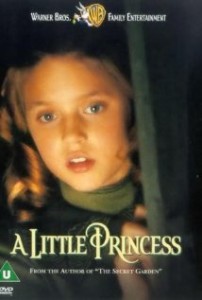“I Get it Daddy.
Can we please just watch the movie?”
My daughter was eight years old.
We were watching the 1995 version of A Little Princess.
 An Englishman goes off to fight in World War I. He leaves his little girl behind in a British childrens’ home. The father has purchased a teddy bear for his little girl as a keepsake. The dad hands the stuffed toy to the daughter. In a solemn moment, he looks deeply into his child’s eyes.
An Englishman goes off to fight in World War I. He leaves his little girl behind in a British childrens’ home. The father has purchased a teddy bear for his little girl as a keepsake. The dad hands the stuffed toy to the daughter. In a solemn moment, he looks deeply into his child’s eyes.
“Whenever you need me, you can talk with me through this bear.”
The weight of her father’s leaving for war fills the dialogue-less space.
And then he utters those famous words:
“If you believe it, then it is real.”
I stopped the video.
I launched into a 60 second preachment about how this is impossible. No one can create reality. No one can simply declare that something “is” or “is not.”
something “is” or “is not.”
We resumed the movie. The phrase “if you believe it, then it is real” was repeated. And I repeated my earlier comments, this time integrating Scriptural statements about God and His world.
I hit the play button. There it was again! The script called for a repeat of “if you believe it”!
I hit “stop,” opened my mouth to speak again, this time in a higher decibel range. And then I felt this little hand on my arm. I looked down into my daughter’s beautiful eyes.
“Daddy. I get it. God made His world. Everything real comes from God.
Daddy? Can we please just watch the rest of the movie?”
 I hit the play button again, without a word. But I smiled. My little girl had delivered her message, but she had clearly received mine too. I followed this process with everything my children watched and listened to in our home. Now grown, they laugh as they tell stories about their father’s conviction. But if you asked them, they would also tell you this: they plan on stopping movies with commentary with their children.
I hit the play button again, without a word. But I smiled. My little girl had delivered her message, but she had clearly received mine too. I followed this process with everything my children watched and listened to in our home. Now grown, they laugh as they tell stories about their father’s conviction. But if you asked them, they would also tell you this: they plan on stopping movies with commentary with their children.
Here is why I hold to my conviction of watching with and commenting on movies with my children: “G”  and “PG” rated movies are the “worst” movies for Christians to watch. Often, magic kingdoms or domains of darkness perpetuate pagan myth without critique. Pocahontas twists history, falsely caricaturing all European settlers as usurpers. The Little Princess reinvents reality. Pinocchio changes authorial intent: in the original book, the puppet was a bad little boy. Fern Gully subscribes to pure pantheism (nature is god). Movies such as Final Fantasy support the Gaia Hypothesis teaching that humans are one with the earth (the definition of “environmentalism”). No movie is beyond the scope of Christian analysis.
and “PG” rated movies are the “worst” movies for Christians to watch. Often, magic kingdoms or domains of darkness perpetuate pagan myth without critique. Pocahontas twists history, falsely caricaturing all European settlers as usurpers. The Little Princess reinvents reality. Pinocchio changes authorial intent: in the original book, the puppet was a bad little boy. Fern Gully subscribes to pure pantheism (nature is god). Movies such as Final Fantasy support the Gaia Hypothesis teaching that humans are one with the earth (the definition of “environmentalism”). No movie is beyond the scope of Christian analysis.
Every movie has to have a moral theme. Stories cannot be told without the tension of good and bad. Some kids’ films, for  instance, will find the basic goodness inside their characters, teaching that people are basically good (Kung Fu Panda). The answer to “What is right and wrong?” can often be left up to the individual (Rango). “Who knows best?” leaves the interpretation of knowledge up to a politically correct point of view (Avatar). Then there is the question of God.
instance, will find the basic goodness inside their characters, teaching that people are basically good (Kung Fu Panda). The answer to “What is right and wrong?” can often be left up to the individual (Rango). “Who knows best?” leaves the interpretation of knowledge up to a politically correct point of view (Avatar). Then there is the question of God.
I will never forget when Tyler, my son, was 3 years old. I came home from teaching. He was watching Sesame Street. I sat next to him and asked him about Big Bird and Ernie. “What did you learn about God in Sesame Street?” I inquired. Tyler’s instantaneous response has impacted the rest of my life. “I did not learn anything about God. They did not talk about Him.” It is not just what is being said in a movie or TV show; often it is what is left unsaid that matters most. If God is absent in the program, a statement is being made. [1]
watching Sesame Street. I sat next to him and asked him about Big Bird and Ernie. “What did you learn about God in Sesame Street?” I inquired. Tyler’s instantaneous response has impacted the rest of my life. “I did not learn anything about God. They did not talk about Him.” It is not just what is being said in a movie or TV show; often it is what is left unsaid that matters most. If God is absent in the program, a statement is being made. [1]
 Questions to ask concerning “family friendly films.”
Questions to ask concerning “family friendly films.”
1. Do we use a 90 minute movie as a visual “baby sitter” without watching with our children?
2. Have we investigated the background to the story? Is the story the same in the movie as it was in the original book? If the original story changed, what point of view is being offered by the movie now? What does the change tell us about the studio’s or the director’s point of view?
3. What are the repeated ideas, quotes, or viewpoints that permeate the movie? Why is repetition important?
4. What visual images are prominent in the movie? Why do they matter?
5. Do we think about how much time watching a movie will take? Have we considered the review process necessary ahead of time? Are we ready to critique what we see and hear? Is there time for discussion before, during, and afterward?
6. How much does cultural pressure compel us to watch the latest movie everyone says is so good?
7. Do we condemn movies intended for children because they contain witches, magic, or other worldly creatures, whether “good” or “bad”? Why or why not?
8. How impressionable is the movie’s music on young minds?
9. What is our response to the statement, “It’s just a movie!”?
10. What makes the hero attractive in a children’s story? What attitudes are pleasing that draw children to a character? How much do feelings compel us to believe the lesson in any story?
____________________________
Mark still stops movies to take notes or discuss them with others. Dr. Mark Eckel stands against thoughtless ingestion of movie ideas. Believing, knowing, and interpreting impact living: the first three are influenced heavily by movies. Discussion of movies has become a key teaching point within Dr. Eckel’s “Theological Foundations for Ministry” at Capital Seminary & Graduate School.
[1] Of course, I do not expect that television or movies will center on the person or nature of God. Nor do I expect that the storyline must include some biblical concepts. My point is simple: the presence or absence of something is a statement of belief.


I loved today’s post. I have a lot of personal problems with G and PG movies and what they teach. I especially dislike Disney princess movies, because I feel that they give girls an idea about what a man and what love should look like, and neither of those Disney depicts in a biblical manner. I hope to use your method now in my own evaluations of movies.
Your point is readily made in the response of your own preschoolers to a watched movie. Our world is permeated with visual media. The discussion and understanding of it is so important to our FAMILY’S!
What a great post. We use Clearplay to edit out the nasty stuff on anything over PG, but you’re so right that we need to look for the absence of God and to look for teaching points for the G and PG movies. I do this but not enough, thanks for the encouragement. It was striking when I told my 5 year old daughter that the fairies she just watched in a movie weren’t real and she said yes they are! We had a talk. At the same time, we need to reiterate that the supernatural things we read in the Bible ARE real.
I loved the post. I actually came up with a game for my kids years ago when they started to watch tv. I call it “Something right, something wrong”. At the end of whatever they watch, they have to tell me something that lines up with truth (the bible) and something that doesn’t. It is a fun way to get them to think critically about what they watch. Unfortunately they will always be watching something, so if I can get them to consistently think critically, and biblically, about whatever they see, they will easily be able to spot the lies the world will teach them. Hopefully they will carry this into their adulthood and recognize the direction the world wants them to take versus the direction God wants them to take.
Thanks for the article – kudos!